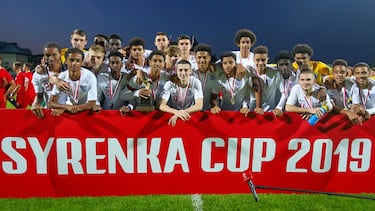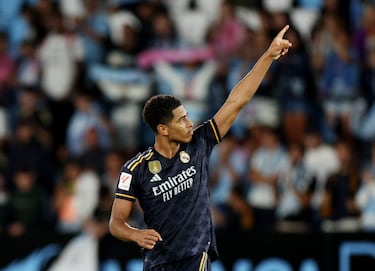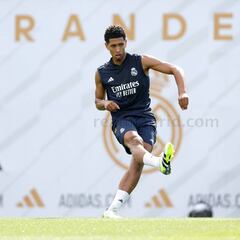Kevin Betsy recalls watching 12-year-old Jude Bellingham play for the first time: “His talent screamed in your face”
Kevin Betsy was key in Jude’s growth, helping his development at youth level for England. He told AS: “Jude always listens and learns at the speed of light.”

“There’s talent that whispers and talent that yells right in your face, and that was Jude”. That was how football coach Kevin Betsy summarized his first impression of seeing Jude Bellingham in action during a chat with AS. At the time, the Real Madrid star was only 12 years old, and Kevin was the England U-15 coach. A brief piece of advice from a colleague: “You need to go to watch him” sent him to Vicarage Road and he was smitten from there. And Bellingham called up. The Stourbridge-born kid gained his football education between the ages of 13 and 17 in the FA under the wing of our protagonist. Betsy is not surprised that Jude has fitted into the role of a No.10 with such ease - a move that has made him a top scorer at Real Madrid. “It was always his best position. We could have won every game with Jude playing as the No.10, but it was not the best for him and for national team in the long-term”. That long-term view is necessary, Kevin stresses, “So you can get the full picture before answering the questions.”
He gives more context: “At that time, English youth football was behind the Spanish system and other leagues. If we wanted to change the technical knowledge of the players we had to change a lot of things. To develop the players better, we try to learn in that sense. We learned a lot from the Spanish model. When our scouts were looking for players, they were looking for the player who was the best in that precise moment. But in Spain, they were looking more in the long term. You work with small and very technical players and when the player grows up, when he gets older, well, you already have that journey done. We had to lose a lot of games to learn that,” he explained.
You might also enjoy
Before getting into the subject of Bellingham, Kevin, a former footballer who made his Premier League debut with Fulham and was international for the Seychelles, fondly remembers a tournament he played against Guti’s Real Madrid in the Spanish capital - in the U19 category, with a London club where his passion for coaching began. “I also remember a trip to Barcelona to see Louie Barry,” when the coach of the Stockport County forward (on loan from Aston Villa) and raised in La Masía “was Victor Valdés.” Two anecdotes before beginning to unpick the qualities and virtues of a Bellingham who “has no ceiling”.
You handed Bellingham his debut in the Under-15s at the age of 13...
That’s right. My first job in the FA was with England Under-15s. We had a head of talent identification called Richard Allen. He had worked with Tottenham and was in charge of the group between 15 and 17 years old, which we called ‘Youth Development Phase’. And we had another group, from 18 to 21, ‘Professional Development Phase’, with another person in charge. The former’s head of recruitment was Daniel Dodds and his previous club was Birmingham City. When I met Daniel, all of the scouts sat down to assess which players we were calling for the next call-up with England U-15. We needed 80. Daniel mentioned many names and suggested that one of them could be Jude.
“I said to myself, ‘Is that the player?’ The trainers told me that yes, it was Jude. On the way home I realized that I had seen something special”
Kevin Betsy, on seeing Bellingham for the first time
Did you know him?
I had never seen him play, but all the reports were very positive and it was my decision whether to call him up or not. Jude was a year younger than the rest. We only selected three players of that age and he was one of them. At first we thought that we didn’t need to call him at that point, but that we could do it the following year, but Daniel said: “Ok, but you need to go to see him play.” In England we don’t usually select players so early, the age group is usually respected. But anyway, we went to Watford, to Vicarage Road. Jude played (with Birmingham City) with the Under-14s, but he was 12 years old. At that stage there are no names on the shirts, or match sheets with the team lists - you have to identify players by their shirt numbers. If I saw someone very interesting I had to go talk to the coach. Jude was the smallest in the group, I promise you. He was very slight, thin, but he went down to receive the ball from the goalkeeper, he had a vision, he could pass the ball... he was capable of overcoming players... And I said to myself, “Is that the player?” The coaches told me later that yes, he was Jude. On the way home I realized I had seen something special. When you are part of the formative stages, we say that ‘there is talent that whispers and talent that shouts in your face’, and that was Jude. I have only worked with two players with that generational talent: Jude and Jamal (Musiala). When you see him, you know that boy is going to be top. He was brilliant. Then we had a meeting. We decided to select him for the U-15 and it went well.
On this day in 2020… 🗓
— The Second Tier (@secondtierpod) July 22, 2023
Jude Bellingham played his last game for Birmingham 💙
It was just the beginning…@BellinghamJude#BCFCpic.twitter.com/Rywvbh96B2
Do you remember the first time you trained him?
Yes. Once we select a player in the federation, he receives the information, but one of the important points of the selector, me in this case, is to establish a relationship with the family. It’s very important. Before, the players were selected, but we didn’t know the person, his feelings. At that time we had five or six get-togethers a year, so it was crucial to make them feel comfortable and get to know them completely. So they could flourish. I scheduled a meeting with officials at Birmingham and met his parents. I explained the plan to them with Jude, who would be playing with the England Under-15 program and was someone we trusted for the future. In the first training session he was already one of the most outstanding, even though he was two years younger than many. It was fantastic. What stood out most, beyond his football abilities, were his personality and character.
Could you already perceive it, even then?
Yes. What we did in the U-15 was to build a favorable ecosystem so that they could enjoy themselves and be the best they could be. We used to say, “Come and play freely.” Then we did various studies. The first conclusion was that it was very difficult for some to play for England. The second, they were not used to playing as a team. The third point was youth leadership. With current technologies and processes, players, especially young players, do not communicate well with each other. They spend a lot of time on the phone... The social skills were not what we wanted. What we had to do in those initial phases was put the players in situations where they faced challenges, where they had to communicate with each other, have tactical discussions. We saw where we could help each other. But Jude could hold his own, at 13, with players older than him in those situations. He was very mature mentally.
Happy 20th Birthday to Jude Bellingham 🎉
— BCFCKRO (@BCFCKRO_) June 29, 2023
Best of luck at Real Madrid, @BellinghamJude 💙 #BCFC #KRO pic.twitter.com/yWwq3GNCBy
If the newspaper archive is true, he was given the U-15 armband at the age of 14...
Exactly, he was the captain. We did it on purpose, because we wanted to develop that leadership capacity even more. We thought Jude would make the senior team. That was the plan. Up to that point we already believed in him. When players are at those ages, if you don’t support them in moments where they suffer, how are they going to improve? It’s not just about winning games at that stage, it’s about individual development. That is the most important thing in development stages. When Germany won the World Cup they had many players who had played together when they were young. The players’ relationships on and off the field were incredible. They had played in important Under-17, Under-21 competitions... They had lived important moments together and that was key at the adult level.
For the FA, I understand that Jude was, already at 13 years old, a key piece for the future?
Completely. Each age group is an important step. If we talk about Jude, with the U-15s he played a year ahead of his age and was also physically inferior. He was playing against the best 15-year-olds in the world and he was behind physically. But we didn’t care about losing a game, what we wanted was for our style of play to be clear: dominate possession and for our boys to improve. It was key that they took the right steps. The following year, instead of sending him to the U-16s, we kept him in the U-15s, with boys of his age. There was a key moment, a tournament in Italy at the end of the season. Some of the best in the world played. There were Mexico, Italy, Argentina... There was a world level. We selected Jude to go with the team, even though he had been injured for two months. We worked very closely with Birmingham and his family. We explained to them that he wouldn’t play as much as he would under normal conditions, but that we needed him there to live the experience. It was important to manage the person. The tournament went well, we won four games out of five and he did well, despite not playing as much.
“Jude was a big fan of Zidane and Steven Gerrard”
Kevin Betsy
What was the next step?
The best tournament we had with Jude was the Montaigu tournament, the unofficial U-16 World Cup (Cristiano, Pirlo, Nedved, Henry, Benzema, Mbappé, Endrick have all passed through there...). It’s a very special event. We did a curious thing to motivate them. We asked them: “Who is your favorite player in the world?” It was a group of 20 players in the room. Some said Ronaldinho, others Zidane, others Cristiano Ronaldo... Not one said an English footballer. We knew what was going to happen. The level was good in England, but there were no idols. Then we asked them the second question. “There is no English player, who from here will be the next Cristiano, the next Zidane?” Because that is the level of players we wanted our boys to aspire to reach. Luckily now we have world-class players: Kane, Saka, Phil Foden... But before, we had good players, but nobody chose them.
Who did Jude choose, do you remember?
I don’t remember it clearly, but he was a big fan of Zidane and Steven Gerrard. At Montaigu, Jude did very well. He scored against Brazil. If you watch videos of Jude there, you see the same movements and skills that he shows now at Real Madrid (laughs). We made it clear to them that this tournament would be their platform. That some of the best clubs in the world would be watching it. “Put yourself in the spotlight.” After the tournament, five or six of our players were targeted by scouts from the best teams in the world and they thought, the English boys have changed. We play a different, very technical, quality football. We don’t play physical games like we did before. A ‘very Spanish’ style. We learned a lot. We finished in third place, we beat Brazil for third and fourth place. We missed a penalty against Argentina that would have put us in the final.

That was with the U-16s?
Yes. In the Under-16s we won many games, but in the Under-17s, where he was also captain, we won the Syrenka Cup in Poland. I remember Jude confessing to me: “It’s the first trophy I’ve ever lifted.” Birmingham always played against great teams and they didn’t win as many games, but they were focused on developing him. That was a really beautiful moment when he told me.
He was the MVP, wasn't he?
Yes. In his first year with the U-17 was when his body changed. He debuted with Birmingham, with the first team. That’s when everyone started talking about him. Then he came with us to the Syrenka Cup and grew taller, stronger... He had grown. At that stage we wanted to build the group to go to the U-17 Euro Cup. We had a very strong team, we beat Brazil twice, France twice... We played very well. We were going to go to the Euros with him as captain, but it was canceled due to Covid. We couldn’t go, he started playing with Birmingham, then he went to Dortmund and the next step was England U21s. He played four games there then went straight into the senior side.
“Bellingham is the boy you would invite to your house for dinner, the son you would love to have (...) He always cleaned up after himself in the locker room when we played away”
Kevin Betsy
It didn’t take long for Southgate to recruit him?
Gareth’s (Southgate) first job was with the Under-21s and when Sam Allardyce left they gave him the senior job. Gareth was always very interested in young players. Jude was always a familiar name to FA coaches, like Gareth, who was always taking note of what was happening with the youth categories despite already being the England manager. We all had the idea that three or four of the players of that generation, that of 2003, would be with him with the seniors in a few years. Some in a year, but that’s not usual. In the 2003 generation there were Levi Colwill, Jamal (Musiala), Harvey Elliot, Liam Delap... It was a great, very strong generation.
⚽️ Another goal for Jude Bellingham as Dortmund stay one point behind Bayern.
— UEFA Champions League (@ChampionsLeague) October 23, 2021
Best teenager in the Champions League this season is _______________.#UCL pic.twitter.com/qIsPZCN9wQ
What was Jude like in the locker room?
Mark Bellingham raised two fantastic youngsters, Jude and Jobe (17, plays for Sunderland). Jude is a guy who, as we say in England, you would invite over to your house to meet your family and have dinner. He is the son you would love to have. He has perfect manners, respect for everyone... He is exemplary. In England, we don’t make many rules about what is correct, we hope that your environment understands it and shows it to you. Jude was very punctual, making sure his team mates were punctual, he picked up litter and whatever got dirty in the locker room when we played away from home, in other countries. He made sure everything was clean. He was one of the leaders to ensure that things were done correctly. You could trust him in any aspect.

Now his maturity in Spain is impressive. What he says makes sense.
You just have to look at his family. All the clubs in the country already wanted to sign him when he was 12 years old, all of them. City, United... they were prepared to invest a lot of money in him at that age. But Jude and his family made the decision to stay at Birmingham as the ideal club to develop before the next step. You have to be very brave to decide like that. You have to have a lot of vision and to do that at that age, when financially it was something with so much impact, it is incredible. This tells you the type of people they are and how they take care of their children’s development. Going to a big club early doesn’t always work. For Jude this worked perfectly. Just like later in Dortmund. They even went to Carrington to meet with United, but they rejected it because they wanted Jude to keep playing. In that United there was Pogba and other great players. Maybe it would have surprised them, but maybe he wouldn’t have played. At Dortmund he was going to play every week and the next club would be one more step. Like Real Madrid. I am happy to see him in one of the best clubs in the world.
Everything went very quickly. That Syrenka Cup was only four years ago. Aren't you surprised by how high the expectation was?
That’s a great question. It doesn’t surprise me, because there is generational talent that is seen every 10 years or more. I was lucky that with England I saw three or four of those who said, “Okay, this player is going to reach the senior side”. The speed with which he has achieved everything is extraordinary. He scored in the Champions League with Dortmund, he was the captain... I always believed in him. But maybe he thought that it would be when he was 22 or 23 when he would reach that level and now, after achieving everything he has achieved, he is barely 20... Playing for Madrid, in that ecosystem, with those players... He’s doing incredibly well. It’s amazing.
“All the clubs in England wanted to sign him when he was 12 years old…”
Kevin Betsy, on Bellingham's first big decision
It seems like he is mentally prepared to be a star, like he doesn’t feel the pressure?
We hope it will be like this for the next 10 years. You have to give credit to his coaches in Birmingham, like Mike Dodds. They did a great job. One of the things they worked on with Jude is that they wanted Jude to be a complete midfielder. The story of the number 22 is famous ("You can be a '4', an '8' and a '10'"), but nobody thought about it before. They wanted a player who could defend, who could travel the field from area to area and capable of breaking lines and filtering passes. They wanted to create the quintessential complete player. That is why he is achieving what he is achieving at Real Madrid.
🟠 @BellinghamJude 🫂 @ToniRuediger 🟠#RMCity pic.twitter.com/OFhwZ9F0av
— Real Madrid C.F. 🇬🇧🇺🇸 (@realmadriden) August 29, 2023
And now playing as a midfielder, and can’t stop scoring goals...
I knew Jude could score goals. With England we were short of players who could play as a ‘6’, able to receive and create, manipulate the ball, turn and manage possession and the situation under pressure. It was a serious problem for us in that formative phase. What we decided was to place Jude there, as a ‘6’, for many games. Although we knew that his best position was as a No.10.
Really?
Yes, it was always his best position to play as a ‘10′. It’s the same thing that happened in Birmingham. If we had wanted to win all the games, Jude would have played as a ‘10’, but it was not the best for him and for the country in the future. We decided to make him play as a ‘6’ for six months, to handle the ball in small spaces at the international level, against the best players at your age. “You are going to have a hard time in some games, but it will be good for you to progress.” This is the process you must follow to develop a player. It’s not all going to come together right away.
“If we had wanted to win all the games, Jude would have played as a ‘10’, but it was not the best for him and for the country in the future”
Kevin Betsy
I’m sorry to insist, but why doesn’t it surprise you that he’s scoring so many goals now?
No, I’m not surprised. Jude’s father, Mark, was one of the best strikers in amateur football, a record holder (he scored more than 700 goals in the English league system). He has always seen his father scoring goals, always. What happened with Jude is that when you play 11 against 11, if you go from one area to another at 15 years old, without physical maturity yet, when you get to the opposite area you are tired. When you go to shoot, the shot loses power. When you are a coach in the formative phase, you see that and you have to understand that when he develops muscularity, the player, Jude in this case, will have a greater ability to finish. When he achieved that physical development he would score more goals. Furthermore, he already scored many goals as a child, when the size of the pitch was smaller.
20 - Aged 20 years and 57 days, Jude Bellingham is the youngest player in the 21st century to score in three consecutive games for Real Madrid in LaLiga. Future. pic.twitter.com/ppsPVaXeF1
— OptaJoe (@OptaJoe) August 26, 2023
Where is his limit?
He doesn’t have one. We’ll see how he continues his path. Let’s hope he has a fantastic career with Madrid and England.
Do you see anything in which he needs to improve?
At this point, Real Madrid is where they can give the correct answer. But one thing I know about Jude is that every challenge and every question you ask him, he always passes the test. Always wants to learn and improve. He has a humility that makes him always want to progress. He always listens and learns at the speed of light. As a coach, you explain an exercise to him in September and you think that in three months he will have it polished, because with Jude it will perhaps be in the next training session or game (laughs). That’s something that can’t be taught.
“Jude always wants to learn and improve, he always listens and learns at the speed of light”
Kevin Betsy
Finally, do you remember any funny anecdotes about Jude?
There are many, but I can't count them (laughs). I remember one. When I was 14 and we were at St. Georges Park, we had a tournament where we played against Brazil and France. The players had to be in bed at 10 p.m. We had to train the next day and play in a couple of days. Jude shared a room with Jamal Musiala. They forged a great relationship with each other and they loved playing FIFA (laughs). That night, the 'player carer' was walking down the hallway and there was a lot of noise coming from his room. He made them leave and they were still playing FIFA at 11:30 p.m. But it wasn't just them, there were other players playing too, half the squad. In the end, even though it was bad, they were competing and working on social skills. But they had to have been in bed by then. It's the only time he did something like that.
Related stories
If that's his biggest prank, it's because he's a good boy.
(Laughs) Yes, we laughed a lot about it later.

